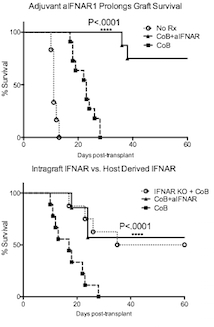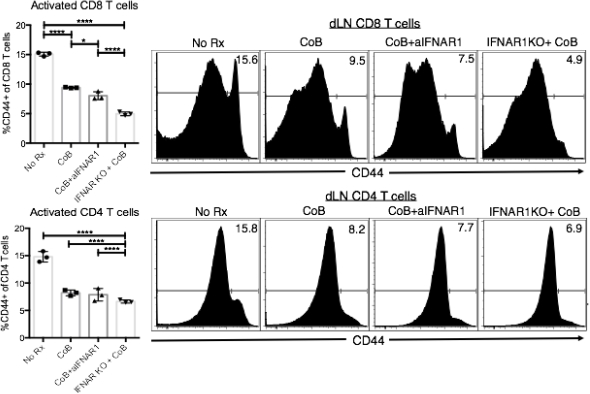Recipient IFNAR1 Signaling Supports Costimulation Independent Rejection by Promoting T Cell Activation
Department of Surgery, Emory University, Atlanta, GA.
Meeting: 2018 American Transplant Congress
Abstract number: 491
Keywords: Co-stimulation, Interferon (IFN), Rejection, T cell activation
Session Information
Session Name: Concurrent Session: T Cell Biology
Session Type: Concurrent Session
Date: Tuesday, June 5, 2018
Session Time: 2:30pm-4:00pm
 Presentation Time: 3:18pm-3:30pm
Presentation Time: 3:18pm-3:30pm
Location: Room 618/619/620
Costimulation blockade (CoB) is a promising strategy for more targeted/less toxic transplant immunosuppression which has led to the first improvement in long-term outcomes for transplant patients in over 30 years. Increased rates of acute rejection have tempered enthusiasm for wider adoption of CoB. Type 1 interferons (IFN) induce an antiviral state in host tissues and augment the adaptive immune response. We investigated the role of Type 1 IFN in costimulation independent rejection. In a stringent model of fully MHC-mismatched skin transplantation from Balb/C (H2d) donors to C57BL/6 (H2b) recipients, untreated mice rejected rapidly (MST=11 days). CoB treatment (250 ug CTLA4-Ig [BMS, Princeton NJ) + 250 ug Anti-CD40L (MR1, BioXCell, Lebanon NH) given by IP injection day 0, 2, 4, 6) improved survival but resulted in CoB-inedependent rejection (MST=23 d  ). CoB+aIFNAR1 (200 ug (MAR15A3, BioXCell) given day 0, 2, 4, 6) abrogated CoB-Independent rejection and significantly prolonged survival (MST>60d). We next asked if this survival benefit was dependent on intragraft activity of IFNAR utilizing IFNAR-/- mice as recipients of Balb/C (IFNAR+/+) grafts. IFNAR1-/- mice treated with CoB and WT mice treated with CoB+aIFNAR1 demonstrated similar graft survival benefit (MST>60d). At day 10 post-transplant, both adjuvant aIFNAR1 blockade, and genetic deletion of IFNAR in recipient mice resulted in a significant reduction in the frequency of activated CD8+CD44+ and CD4+CD44+ T cells.
). CoB+aIFNAR1 (200 ug (MAR15A3, BioXCell) given day 0, 2, 4, 6) abrogated CoB-Independent rejection and significantly prolonged survival (MST>60d). We next asked if this survival benefit was dependent on intragraft activity of IFNAR utilizing IFNAR-/- mice as recipients of Balb/C (IFNAR+/+) grafts. IFNAR1-/- mice treated with CoB and WT mice treated with CoB+aIFNAR1 demonstrated similar graft survival benefit (MST>60d). At day 10 post-transplant, both adjuvant aIFNAR1 blockade, and genetic deletion of IFNAR in recipient mice resulted in a significant reduction in the frequency of activated CD8+CD44+ and CD4+CD44+ T cells.  These data suggest that IFNAR1 signaling augments the alloimmune response and supports costimulation independent rejection.
These data suggest that IFNAR1 signaling augments the alloimmune response and supports costimulation independent rejection.
CITATION INFORMATION: Mathews D., Ghosh A., Dong Y., Polireddy K., Stephenson A., Breeden C., Liu Y., Adams A. Recipient IFNAR1 Signaling Supports Costimulation Independent Rejection by Promoting T Cell Activation Am J Transplant. 2017;17 (suppl 3).
To cite this abstract in AMA style:
Mathews D, Ghosh A, Dong Y, Polireddy K, Stephenson A, Breeden C, Liu Y, Adams A. Recipient IFNAR1 Signaling Supports Costimulation Independent Rejection by Promoting T Cell Activation [abstract]. https://atcmeetingabstracts.com/abstract/recipient-ifnar1-signaling-supports-costimulation-independent-rejection-by-promoting-t-cell-activation/. Accessed February 14, 2026.« Back to 2018 American Transplant Congress
